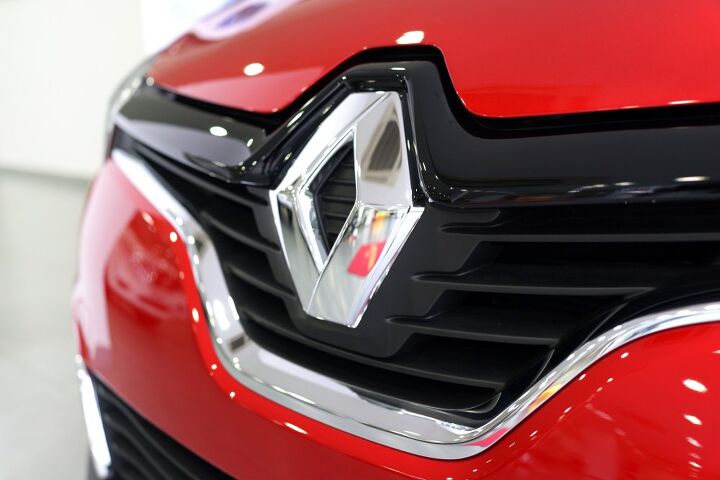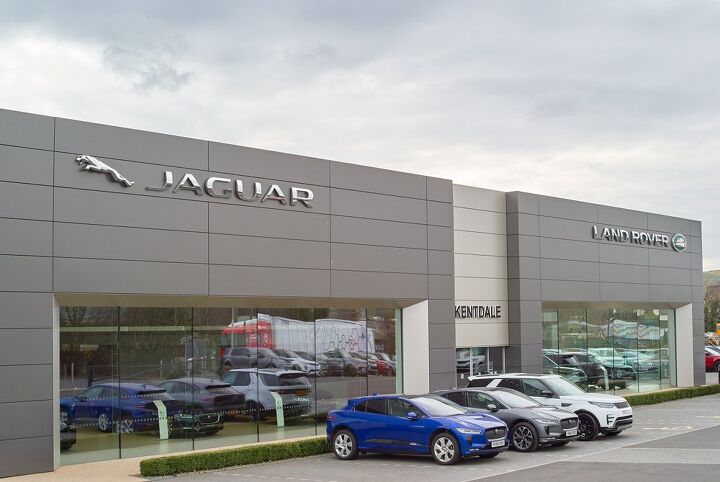#AutoSales
U.S. Car Sales Are Down, Average Transaction Prices Are Up
Yesterday, we covered how the economic ramifications of the pandemic has negatively impacted the sales volume of electric vehicles (the ones that aren’t status symbols, anyway) in the United Kingdom. We’ll take a broader view of things today, focusing entirely on the general sales trends taking hold in the United States ahead of the Labor Day weekend.
Under normal circumstances, this would be a period where dealerships tempt the public with juicy discounts to clear out their lots for the subsequent model year. But the pandemic has left factories idle for months and vehicles in short supply. While that wasn’t an issue when everyone was first locked indoors, many states allowed their citizens to reclaim their autonomy as dealers sought new ways of selling without the face-to-face rigamarole of interacting with customers directly. We’re now in a situation where demand remains suppressed but has increased to a level where it outpaces the supply of many popular models — increasing the average transaction price of vehicles.
It’s not a great time to be shopping for a car.
Study: Global Recession Negatively Impacting EV Sales (Duh)
Today’s study comes straight from the memoirs of Captain Obvious. Apparently, an economic recession isn’t what you want when you’re vying to sell factory fresh automobiles beyond the confines of rock-bottom prices. There might even be a correlation between being broke and lacking the ability to purchase items in general. At least, that was the takeaway from a cutting-edge assessment recently conducted by Auto Trader in the United Kingdom.
In an attempt to keep tabs on the public’s level of interest in reference to electric vehicles, the outlet has been surveying people at semi-regular intervals. Back in January, it asked 2,300 consumers ‘waddya buying,’ only to learn that 17 percent had their hearts set on a battery electric vehicle. That’s impressive considering less than 10 percent of automobiles in the UK utilize electricity for propulsion and most of those happen to be hybrid models. But the trend toward BEVs has shifted rather dramatically since the COVID pandemic took hold.
A follow-up questionnaire from August (this time with 2,700 respondents) shows demand has waned immensely. Only 4 percent of respondents said they were planning on getting themselves a battery electric vehicle.
AutoNation Ending Aftermarket Collision Parts Division - Shrewd or Crude?
AutoNation’s collision parts division is scheduled to be eliminated by the end of 2020, freeing up some cash after the two-year endeavor proved less than profitable.
Former CEO Cheryl Miller had made it clear that one of her main goals for the company was to ramp up services in an attempt to enhance revenue and diversify the business. But this tactic has proven perilous for the automotive industry at large, often offsetting opportunities to make money with sizable financial risks.
Mobility is probably the best example of this, as its broad enough to encompass everything from self-driving vehicles to subscription models and relies on the market maturing into something that will presumably see returns on investment years down the line. However, AutoNation’s diversification was far more traditional. It seemed like a sure thing, since the collision parts business was forecast to grow over the next five years. In fact, despite being the the largest automotive retailer in the United States, the company actually owes 46 percent of its gross profit to parts and service. Selling cars (both new and used) only accounts for 24 percent — with the rest coming from finance and insurance.
China's Geely Adjusts End-of-year Outlook
China’s Geely Automobile Holdings reported a first-half net profit drop of 43 percent on Monday, a tumble that forced it to reduce end-of-year targets. As you may have expected, the coronavirus was named as the biggest obstacle it had to overcome, especially in its home country. That left Geely (parent to Volvo, Lotus, Proton, Lynk & Co, Emerald Automotive, London EV and more) revising 2020 volume estimates by 6 percent to 1.32 million vehicles against the 1.36 million deliveries it enjoyed through 2019.
While enduring a bad financial year in 2020 is hardly breaking news for any major automotive manufacturer, Geely is one of many Chinese firms with global aspirations. Its role as Daimler’s second-largest stakeholder and ownership of Volvo Cars (with which it is planning a full merger) arguably makes it the corporation that’s closest to achieving that goal, too. Yet the current economic and geopolitical situation served to undermine its ultimate goal of becoming Asia’s answer to Volkswagen Group.
Renault Reports Staggering $8.6 Billion Loss
Already in the midst of a comprehensive restructuring plan with partners Nissan and Mitsubishi, Renault announced a staggering 7.29 billion euro ($8.6 billion) loss on Thursday. That tally encapsulates the first half of the year and marks a new record for the brand, even if it’s not the kind one normally celebrates.
“Although the situation is unprecedented, it is not final. Together with all of the Group’s management teams and employees, we are fully dedicated to correcting the situation through a strict discipline that will go beyond reducing our fixed costs,” new CEO Luca de Meo said in response to the dismal financial report. “Preparing for the future also means building our development strategy, and we are actively working on this. I have every confidence in the Group’s ability to recover.”
Nissan Predicts $4.5 Billion Operating Loss
Based on Mitsubishi’s bleak assessment of its own future, you might have thought it would be the automaker winning this week’s award for saddest economic forecast. But Nissan refused to be outdone. Having already warned the world that 2020 would prove harrowing even before anyone heard the term “COVID-19,” the brand now predicts an operating loss of 470 billion yen ($4.5 billion USD).
Nissan likewise estimates total revenue declining by one-fifth through year’s end to 7.8 trillion yen ($74.1 billion) as its worldwide vehicle sales continue a longstanding retreat.
While it’s difficult to know what to peg these losses on, there are a few obvious suspects. Both automakers sacrificed their identities as automakers in order to spend years trying to expand globally, with a particular focus on developing countries and bland models assumed to have mainstream appeal. Nissan even re-launched the Datsun name as an affordable alternative in places like India, but it wasn’t the sales success the company envisioned.
Maybe Next Year: Volvo Pushes Back Sales Targets to 2021
Volvo Cars will be unable to reach its global volume target of 800,000 vehicles this year. Considering everything that has — or hasn’t — happened in 2020, any automaker that ends the period moving more metal than they did in 2019 should probably have a statue erected in front of their headquarters celebrating a major industrial achievement.
Volvo sold 705,452 units the last time our Earth went around the sun, forcing it to face the music when considering goals in what CEO Håkan Samuelsson calls the “corona year.”
Swift Economic Recovery in GM CEO'S Crystal Ball
General Motors CEO Mary Barra predicted a brief recession and streamlined economic recovery in a recent interview. Mixed in with favorable coverage of how the company saved Michigan’s Governor Gretchen Whitmer by manufacturing personal protective equipment intended to combat the pandemic, the Detroit Free Press took time out to get Barra’s expert opinion on various subjects.
She mused that a 300-mile range will be the sweet spot for GM’s electric vehicles, noting that the company may eventually offer distances in excess of that with its new Ultium platform, and touted the merits of the Inclusion Advisory Board she recently placed herself at the head of. Things began to get more substantive when she attempted to predict how long the economy would languish as a result of COVID-19 lockdowns
Nissan Predicts Incredibly Lean Year, Plans Accordingly
Nissan’s all-important turnaround has been complicated immensely by the coronavirus pandemic. Supply chains fell into in shambles as countless factories temporarily closed as a countermeasure, harming profits as demand came to a screeching halt. Now there’s a looming recession that many economists fear may surpass the Great Depression — though this was a concern years before the COVID response hit the accelerator, thanks to growing debt and the way finance has been allowed to operate for decades.
Seeing the writing on the wall, many automakers have tamped down expectations for 2020. Being in the peculiar position of restructuring before the pandemic hit — which isn’t all that unique within the industry, truth be told — Nissan is reportedly plotting a 30 percent year-on-year cut in global production.
Now Might Be a Good Time to Sell Your Car
After coronavirus lockdowns wiped out vehicle production for a few months, dealer inventories are going to have to wait a little longer than normal to be resupplied with new product. Meanwhile, the used market has become awash with cars offloaded by rental agencies with no use for them — except as a way to drum up cash during a difficult time.
Chuck in every American citizen getting free money from the government and you’ve got yourself the perfect storm. Average folks are thinking about using that money on a new car and dealers need to offset depleted inventories and delayed deliveries by scooping up used ones for the purpose of flipping. That’s driven up prices, which could potentially work in your favor if you happen to have an automobile you no longer have much use for.
AutoNation Cutting Roughly 3,500 Jobs
After furloughing staff in response to the coronavirus pandemic, AutoNation has gradually allowed employees to return back to work. Half of the 7,000 people asked to take it easy in April won’t be coming back at all, however.
The automotive retailer has decided to permanently cut 3,500 jobs so it can focus on its bottom line and what it has unsettlingly called “the new normal” — a term frequently used to rationalize unsavory actions taken during the health crisis.
With customers unable to leave their homes to purchase cars, it’s to be expected that America’s largest automotive retailer would need to engage in some light restructuring. It also happens to have the best excuse imaginable for nuking a large portion of its workforce. Back in April, when the AutoNation was furloughing employees, it received nearly $95 million in federal small-business funds via the Payment Protection Program (PPP). A subset of anonymous staff members were said to have leaked the details to the media after deciding the firm was taking cash allocated for smaller outfits.
Outrage ensued and the company sheepishly returned the money.
Michigan Auto Dealers Allowed to Resume Operations Under New Guidelines
Michigan auto dealers will be allowed to resume in-person sales on Tuesday, according to the latest in a long list of executive orders signed by Gov. Gretchen Whitmer. The state, which harbors the fourth-highest coronavirus death toll in the country (following New York, New Jersey, and Massachusetts), has enacted some of the strictest countermeasures in the country.
This has created no shortage of pressure to both reopen Michigan so life/business can return to normal and maintain closures to avoid further contagion risks. Obviously, that’s proven difficult to do. All steps taken towards reopening come with conditions, including those established for Michigan’s dealerships.
But first, some backstory.
China's Auto Market Revisited
Chinese auto sales grew 4.4 percent last month vs a year earlier, rising to 2.07 million vehicles, according to tabulations released by the government-backed China Association of Automobile Manufacturers (CAAM) on Monday. This is actually better than its preliminary assessment suggested, with the new figure helping put an end to a 21-month slump of declining automotive sales.
Unfortunately for the region, it doesn’t seem to be indicative of a full recovery. In its report, CAAM noted that the rebound may be only temporary. Last month’s figures were primarily elevated by commercial vehicles, which saw record growth at 32 percent (year over year). Passenger vehicles also saw their numbers improve from the month prior, but they still down 2.6 percent in April. The improvement is widely seen as the result of backlogged orders that couldn’t be completed during the most prohibitive period of the pandemic, as well as the Chinese Communist Party ordering more work vehicles to stimulate the economy.
Did Chinese Auto Sales Recover Last Month?
The China Association of Automobile Manufacturers (CAAM) reports that April was healthier than expected, resulting in an estimated 2 million new vehicle sales. This would be the first time in a couple years the market has seen any monthly growth, with CAAM taking to the Tencent-owned WeChat to announce a single-percent gain over April 2019.
Considering the pandemic is anticipated to suppress global auto sales by anywhere from 10 to 20 percent, it seems premature to call anything a victory. Likewise, influence from the Chinese Communist Party has made any statistics coming out of the country highly suspect. Much of the world is currently under the impression that the nation’s leadership is in an all-out effort to project the country’s strength after failing to share helpful information in a timely manner and downplaying its coronavirus-related deaths. We don’t know what information is credible, especially since all groups (which includes individuals, state institutions, and corporations) are required by law to have direct ties to China’s only political party.
So that’s it then? It’s all bunk? Not quite. While there are plenty of reasons to doubt information coming out of China, there are also reasons to buy what CAAM is selling.
UK Car Sales See Worst Month in 74 Years
With COVID-19 lockdowns suppressing auto sales around the globe, everyone expected April to be a rough month. However, we doubt the United Kingdom expected monthly deliveries to come in at the lowest level since the end of World War II. Registrations for April peaked at 4,321 in the UK, representing the lowest monthly figure since 1946 — when the nation was still rationing materials as it attempted to rebuild after a prolonged military conflict (and factories were just starting to transition back to manufacturing passenger vehicles).
While it’s possible some registrations are simply delayed, the Society of Motor Manufacturers and Traders (SMMT) says it doesn’t believe that to be a significant factor. Retailers typically register the vehicle for you and, with with precious little else to do, you’d think they’d have finished whatever paperwork they had lying around. Most of them, of course, weren’t capable of operating normally due to government mandates, allowing the few outlets offering at-home delivery to make up the lion’s share of sales.






























Recent Comments